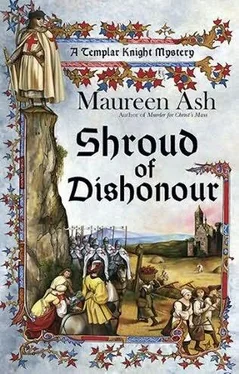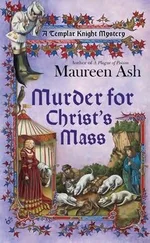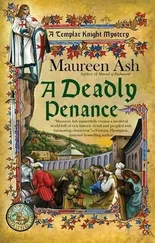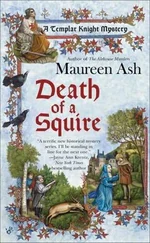Maureen Ash - Shroud of Dishonour
Здесь есть возможность читать онлайн «Maureen Ash - Shroud of Dishonour» весь текст электронной книги совершенно бесплатно (целиком полную версию без сокращений). В некоторых случаях можно слушать аудио, скачать через торрент в формате fb2 и присутствует краткое содержание. Жанр: Исторический детектив, на английском языке. Описание произведения, (предисловие) а так же отзывы посетителей доступны на портале библиотеки ЛибКат.
- Название:Shroud of Dishonour
- Автор:
- Жанр:
- Год:неизвестен
- ISBN:нет данных
- Рейтинг книги:5 / 5. Голосов: 1
-
Избранное:Добавить в избранное
- Отзывы:
-
Ваша оценка:
- 100
- 1
- 2
- 3
- 4
- 5
Shroud of Dishonour: краткое содержание, описание и аннотация
Предлагаем к чтению аннотацию, описание, краткое содержание или предисловие (зависит от того, что написал сам автор книги «Shroud of Dishonour»). Если вы не нашли необходимую информацию о книге — напишите в комментариях, мы постараемся отыскать её.
Shroud of Dishonour — читать онлайн бесплатно полную книгу (весь текст) целиком
Ниже представлен текст книги, разбитый по страницам. Система сохранения места последней прочитанной страницы, позволяет с удобством читать онлайн бесплатно книгу «Shroud of Dishonour», без необходимости каждый раз заново искать на чём Вы остановились. Поставьте закладку, и сможете в любой момент перейти на страницу, на которой закончили чтение.
Интервал:
Закладка:
“We are going to simulate the method of attack most favoured by the Saracens when they encounter a troupe of Christian soldiers,” he informed the men of the contingent when they were all assembled. “The heathen will do their utmost to entice you into breaking out of formation. Saracen horses are smaller than ours and therefore fleeter of foot, and they will dart in, feint an attack, and then retreat, attempting to lure you into chasing them. If you are foolhardy enough to fall into that trap, you will find a dozen infidels hidden behind the next sand dune. One or two Christian soldiers, no matter how well armed, are no match for such a large number. You will be captured or killed. It is essential you obey your commander and do not engage the enemy until you are given the order to do so. This is a lesson you must learn for, if you do not, you will pay for your ignorance with your life.”
Leading them down onto the grassland until they were about a mile and a half distant from the preceptory, he gathered the men of the contingent into a troupe behind him, knights and squires in the van, men-at-arms behind, and led them in repeated charges up the hillside towards the enclave. In seeming cooperation with the preceptor’s intention, the sun shone down with a brilliance unusual for this time of year, and more in keeping with the later months of summer. Although the temperature was not nearly as high as it would be in the Holy Land, it was warm enough that perspiration soon began to trickle beneath chain mail shirts and helms, and the dust thrown up by the horses’ hooves stung the men’s eyes and clogged their nostrils. As d’Arderon led each charge up the grade of the hill, the brothers from the enclave staged the rapid assaults the preceptor had spoken of, riding just close enough to be out of reach of the swords carried by the men in the troupe and then firing an arrow or throwing a lance before darting back to a safer distance. Although the missiles were blunted, if one managed to find its way past the kite-shaped shields, the impact struck sharply against protective mail shirts and leggings, delivering painful bruises. And there was always the chance of serious injury if one should happen to land on the exposed portion of a face only partially protected by the nasal bar on helms. It was a gruelling drill, but d’Arderon hoped it would distract the men from contemplation of the circumstances surrounding the harlot’s death. Again and again, the preceptor led them through the exercise, admonishing the men who followed to keep close together and not allow the encircling men-at-arms to tempt them into retaliation unless he gave the command to do so. It was the strength of the Templar forces that obedience to their leader was absolute. A moment of impatience in a lonely stretch of desert could cost a man his life.
Emilius took up a position at the rear of the band. Despite the physical disadvantage of his crippled arm, years of battle experience made him an implacable deterrent to any who strayed from the tightly packed formation ahead of him. Wrapping the reins of his horse around the pommel of his saddle, in his strong right arm he carried a mace from which the flanges had been removed. To any who seemed about to swerve out of line, he kicked his mount forward and, guiding the animal with his knees, swung the mace onto the offending Templar’s shield. The hefty blow resulted in a bone-shaking jar that was sufficient to remind any negligent brother of the need to keep within the tightly packed formation.
The preceptor kept the men at the exercise for most of the morning. As the hour of noon approached, he separated the knights and squires from the rest and, taking them down to the flatland at the bottom of the hill, drilled them in repetitions of wheeling their horses en masse to face different directions, always keeping together in a solid bloc. When under attack, the ability to turn and present a united front to the enemy was of prime importance. Since men-at-arms often fought as infantry, Hamo took over their training, marching them forward and back in a solid rank and, at his command, pivoting shoulder to shoulder with shields enarmed. By early afternoon their passage had scarred the side of the hill with a wide swathe of churned up earth. The only breaks permitted were to rest the horses, or exchange tiring mounts for fresh ones. None were allowed to take a midday meal and thirst was quenched by a few meagre swallows of ale from a keg placed at the top of the hillside. At the hours of divine office, a short respite was allowed while the required number of paternosters for each service was repeated, just as if the men were on active duty and unable to attend services in their chapel.
At two hours past midday, the preceptor gave the little band a brief rest after which, he said, the knights would engage in combat with lances. The men-at-arms were to set up butts and improve their archery skills.
There were four brothers of knight’s rank in the contingent and these, with their squires, took up places on a level stretch of ground. D’Arderon and Emilius rode down to watch the contest, leaving Hamo in charge of the men-at-arms. The preceptor and draper watched the knights’ manoeuvres with interest, weighing up the expertise of each. Two of the knights were young men who had only recently received the buffet of knighthood and had little battle experience. The other two were older, both men who were approaching their fortieth year. One of these had told Emilius he had once served with King Richard’s forces in Normandy in the years before the monarch’s death, and had fought alongside William Marshall, a famed paladin despite his advancing age, in the attack on the French castle at Milli, near Beauvais, in ’97. Having returned to England shortly after that encounter, the knight’s reflexes had slowed somewhat during the intervening years of peaceful inactivity, but the training he had undergone since joining the Templars had encouraged their sharpness to return. After only one pass, he and the other older knight, a crusader who had followed King Richard to the Holy Land in 1192, had unhorsed both of the younger knights and prepared to pit their skills against each other. Twice the pair ran a course across the hillocky grassland, the twelve foot lances crashing onto each other’s shields, but with both managing to deflect the blow and maintain their seats. As they drew apart and wheeled their destriers for the third time, the knight who had fought with William Marshall tried a different tactic. Instead of aiming the blunted twelve-foot shaft at the shield of his opponent, he held it low, as though he was tiring and could not couch the lance firmly under his arm. The former crusader was quick to take advantage of this seeming weakness and spurred his horse forward, his lance levelled for a clear hit on the shield of his adversary. At the last moment, his opponent raised his lance and, with a swift movement, knocked the other shaft aside and then, with the full weight of his body, thrust himself sideways and drove his shield into that of the former crusader, toppling him from the saddle. Shouts of admiration burst forth from the watching men and a groan of despair from the fallen knight’s squire.
“That man will be a valuable addition to the commandery in Portugal,” d’Arderon said to Emilius.
“And I thank God for him,” the draper replied with enthusiasm. “They have great need for men of experience.”
As it was now approaching Vespers, d’Arderon called a halt to the training and ordered the men to return to the enclave, hoping the day’s demanding activity had put new heart into all. For a short time, as they lined up to ride through the gate into the preceptory, there was a brief burst of exhilaration as tactics and weapons were discussed, but it was short-lived. Once inside the commandery, an unnatural silence fell, and it was not broken as the Templars stabled their horses and then crossed the compound to attend the early evening service in the chapel. Despite d’Arderon’s efforts, a pall of despondency still engulfed them all.
Читать дальшеИнтервал:
Закладка:
Похожие книги на «Shroud of Dishonour»
Представляем Вашему вниманию похожие книги на «Shroud of Dishonour» списком для выбора. Мы отобрали схожую по названию и смыслу литературу в надежде предоставить читателям больше вариантов отыскать новые, интересные, ещё непрочитанные произведения.
Обсуждение, отзывы о книге «Shroud of Dishonour» и просто собственные мнения читателей. Оставьте ваши комментарии, напишите, что Вы думаете о произведении, его смысле или главных героях. Укажите что конкретно понравилось, а что нет, и почему Вы так считаете.












